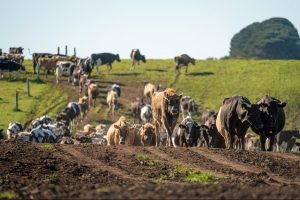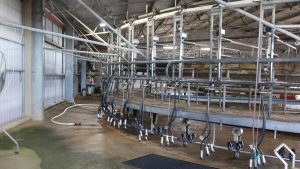
Gross profits were up 33 per cent, with revenue 2pc higher while cost of goods sold fell 2pc.
Less clear cut are the gains in farmer trust. Fonterra Australia conducts monthly surveys of its suppliers and managing director René Dedoncker said the feedback had been very positive.
“Our journey over the last five or six years has been to be firstly consistent, then for that to turn into confidence and, slowly, for farmers of their own choice to start to use the word ‘trust’ again, and we’re seeing that,” he said.
“We talk to farmers every month and we have a net promoter score. Our net promoter scores have been, for 20 or 21 months now, incredibly positive with free commentary.”
Mr Dedoncker said Fonterra Australia was listening to farmers and providing good on-farm support services, such as agronomy. Its decision to announce the opening milk price early last season, he said, was an example of its response to farmer feedback.
Reputation is Fonterra’s recipe for success
“Our recipe for success is reputation matters,” he said.
“We’re doing what we say we’ll do, we then need to run a healthy business.
“We’re really clear on our priorities. It’s a competitive farmgate milk price, building confidence, and it’s a shareholder return and we found the balance between those.”
Farmer representatives were less glowing about the perception of Fonterra Australia.
Tasmanian Farmers and Graziers Association dairy councillor Andrew Aldridge, himself a long-standing Fonterra supplier from northern Tasmania, said the 2016 milk price ‘clawback’ had changed the way farmers perceived Fonterra.
“The reality is that, in general, processors will have a long way to go to prove to farmers that, as part of their decision-making processes, the best interests of farmers is front and centre,” he said.
“What I think Fonterra has recognised, to their credit, mainly through the disaster that was the collapse of MG, is that the only way to rebuild confidence is to develop more transparency with their suppliers.
“Are they perfect? Definitely not! But they are currently doing the best of anyone else I see at this moment in time, mainly due to the structure of their supplier council.”
United Dairyfarmers of Victoria vice-president Mark Billing said, because the surveys did not include those who had supplied Fonterra in 2016 and since left, results were unlikely to reflect the general perception of Fonterra among Australian dairy farmers.
“I really do hope that, after what Fonterra did in 2016, they acknowledge that they’ve got to rebuild their reputation and I think a lot of the other processors hope that Fonterra build their reputation up because it reflects badly on all the processors and they’re acutely aware of bad behaviour,” he said.
Fonterra class action looms
Mr Billing said the class action scheduled to come to trial in November this year could also have a bearing on Fonterra’s need to rebuild farmer trust.
“They’d want to be able to point, I would suggest, to some better behaviour if it was deemed their behaviour wasn’t up to scratch in 2016,” he said.
The positive news could hardly come at a better time for Fonterra, which is conducting an “ownership review” of its Australian business.
The lawyer fronting the class action, Adley Burstyner’s David Burstyner, said more than 300 out of the 1300 Fonterra suppliers of 2016 had registered in support of the class action.
He said working through 55,000 documents and witness statements from Fonterra personnel had made the legal team “even more confident of success”.
The class action seeks compensation for farmers for the difference in milk price between $6.83 a kilogram of milk solids and $1.91/kgMS for May and June of 2016, plus consequential losses such as the “fire sale” of cows.
Shrinking milk pool struggle
Shrinking cow numbers and milk production continues to be a headwind for Fonterra Australia and other processors around the country right up to today.
Fonterra’s interim financial report puts it down to seasonal conditions and “a broader rationalisation of herd sizes supported by strong beef prices”.
Mr Dedoncker added the lack of suitable labour as another challenge for the industry, which both Mr Aldridge and Mr Billing said had put a handbrake on growth, along with spiralling input costs.
The record farmgate milk prices had gone some way to making up for the increased costs but needed to continue to rise if milk production was to be maintained, the two dairy farmer representatives said.
International dairy commodity prices are still very strong and the forecast farmgate milk price for New Zealand is $NZ9.30-$9.90/kg/MS while Fonterra Australia’s quoted average is AUD7.30/kg/MS.
Mr Dedoncker acknowledged the gap but said most Fonterra Australia farmers understood that Australia’s focus on the domestic market meant there were none of the highs and lows of NZ’s export focused industry.
But Mr Aldridge said that when the domestic market was high, processors told farmers prices were still tied to international price benchmarks.
“I don’t think it’s swallowed hook, line and sinker by farmers like they think it is,” he said.
It all comes while Fonterra conducts an “ownership review” of its Australian business, which is widely interpreted as a partial sale. Mr Dedoncker said there was no deadline for the finalisation of the review.
























